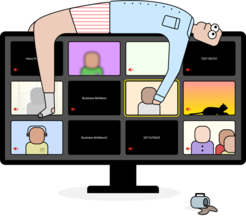Zooming in and zoning out!
Why we hate online meetings
By: Srinath Ramkumar

Alright, let’s be real, Zoom has taken over the world now, and it has become eponymous with the idea of a meeting. Even the 73 year old gardener of my parent’s apartment suggested a meeting over Zoom to discuss the issues with overgrown plants. Well, not really, but you get the point. We’ve started using Zoom with such a high frequency that we’ve forgotten what it feels like to have a conversation without latency and delay. We’ve forgotten how to make conversation without asking if everyone hears us first. We’ve forgotten days when people would give attention to a speaker, without the speaker having to ask for that repeatedly.
This leads me into the conundrum that we face. Zoom meetings have become a part of our lifestyle, and problems which could have been solved with a simple email have suddenly become a 30 minute (or longer) zoom call. Is zoom actually helping us improve our daily life, or is it just creating more avenues for us to be reached, even when we don’t want to be reachable? Is this level of hyperconnectivity actually helping us create better bonds with the people around us? Or is it simply making us pay a hefty price using our attentiveness and ability to focus on tasks?

I can start discussing this from the advent of the pandemic last year, around March. Things were grinding slowly down to a halt, people were afraid of one or two reported cases in cities within a 50km radius. Reports were coming out discussing the potential high risk of death, fast spread of the virus, and everyone was becoming an expert in virology. The chief reason for that was the sheer number of new online “webinars” and “conferences”. There was a new webinar every day about some new topic which was highly recommended for PhDs. The ability for people to attend a wide range of conferences increased, but at the same time, the exposure to bad meetings increased multifold.
Why am I rambling on without any context to the zoom meetings topic I started, you ask? You see, Lab meetings were still supposed to continue, and the Lord Almighty “Zoom” was chosen as the most preferable choice by my boss. The number of zoom meetings per week amplified exponentially, almost as fast as the virus. This was due to the fact that people could now present their project updates from their desks. Doctoral Researchers (DRs) being students could be asked to present their latest progress about newer topics from their homes, in Journal Clubs. And the boss was not travelling for work, hence had a lot more time on their hands, new meetings cropped up in the form of “Student Meetings”, “PostDoc Meetings”, and so on and so forth. In effect, this led to more and more time spent in front of a light emitting digital screen.
Now then, with all the above, we need to delve into the inner workings of the human brain to understand why we feel this sense of brain drain from zoom meetings in particular more than regular meetings. Human interaction is not only about what a person says or does, it is also about the multiple non-verbal cues that our brain has evolved to observe and look for in conversation. Generally speaking, we tend to search for these cues in meetings, not just at the person talking, we tend to look around the room to identify the way others are reacting to what’s being said. With zoom meetings, these cues are often absent, and much more difficult to decipher over a flat screen without any clear indication of three dimensional space. As this is compounded with the increased number of instances where we face such a scenario, the human brain starts to feel tired of searching, and this is perhaps the major contributor to the feeling of brain drain that one tends to experience.

How do you deal with this, you ask me? Honestly, I don't know. I have been reading online to see if there are any suggestions, and major ones include phrases like “switch off your camera”, “take a walk”, “look into the distance and try to concentrate on the voice”, etc., but honestly, none of these work for me. As an auditory and kinaesthetic learner, I tend to learn more when I’m just listening, and doing experiments. I could easily listen to the meeting like listening to a Podcast, but the demand for active presence makes this more complicated. Also, for presentations involving screen sharing, and data being shown on screen, the additional visual cues become more apparent and they require more attention in order to fully understand what’s being said. As a result, we end up in a situation without a clear solution that can allow us to preserve our mental acuity.
We can only wait until the pandemic comes to an end, and we are able to return to face to face meetings. With regard to existing online meetings, we could shorten them, keep them to the point. With regards to returning to in person meetings, what we can do is to hope the government is able to get everyone vaccinated to reduce hospitalizations and death counts, which would eventually downgrade the pandemic to nothing more than a seasonal flu like illness. With the given widespread number of mutations and variations to the virus, this seems to be our best case scenario. Anyway, how about that for a motivational morning masterpiece of a magazine article?
References:
Zoom fatigue' is taxing the brain. Here's why that happens. National
The Interplay Between Face-to-Face Contact and Feedback on Cooperation During Real-Life Interactions
Zoom, Pow, Crash: Why Video Calls Are Sapping Your Superhero Strength


